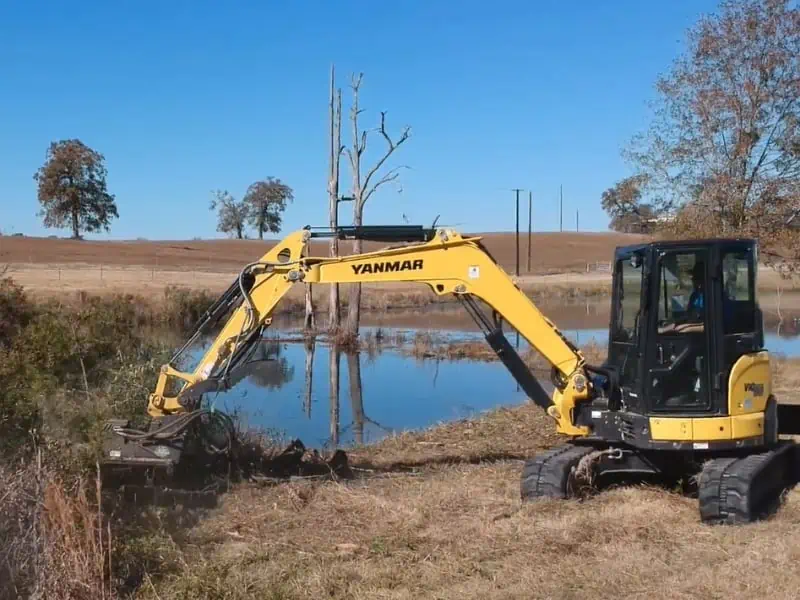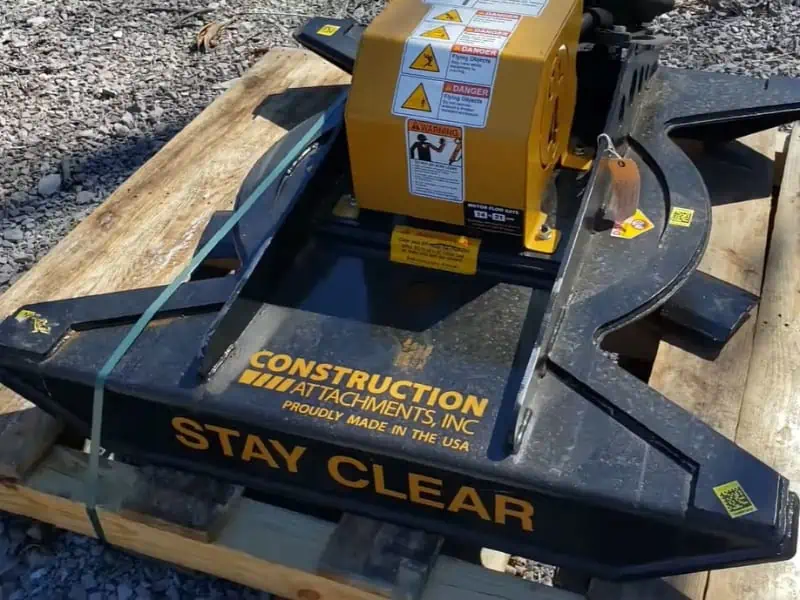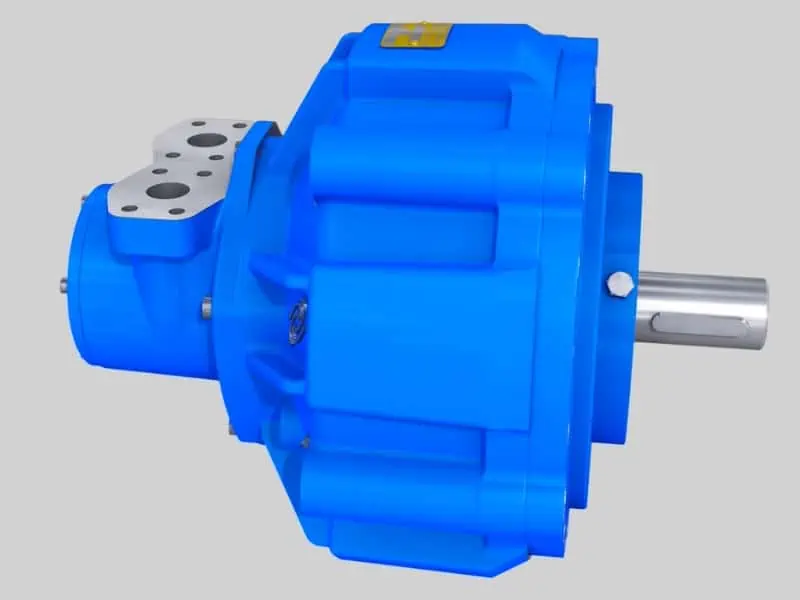UN mini excavator brush cutter attaches to a mini excavator and uses for cutting brush and small trees. It consists of a rotary cutting head with multiple blades that spin rapidly to chop down vegetation. The attachment is commonly used for land clearing, forestry work, and landscaping. It allows precise cutting in tight spaces and can easily maneuver around obstacles such as rocks, stumps, and trees.
When selecting a mini excavator brush cutter, the attachment, size, and power of the excavator will be attached. It is also important to consider the type of vegetation that will be cut and select a cutting head with the appropriate blades. The mini excavator brush cutter has gained widespread popularity due to its exceptional value proposition and compatibility with various mini excavator brands.
These models cater to a diverse range of weights, from the lightest at 550 pounds to the heaviest at just over 900 pounds, making them an optimal fit for mini excavators weighing 6,000 to 19,000 pounds. Roller motors are known to promote extended service life with a lower likelihood of sudden failures, making them a preferred choice over other designs.
Table des matières
BasculerWhat To Look For in a Mini Excavator Brush Cutter
When selecting a mini excavator brush cutter, there are several key factors to consider, including:

Compatibility:Ensure the brush cutter matches your mini excavator brand and model.
Size and Weight:Consider the size and weight of the brush cutter attachment and ensure that it is appropriate for the size and weight of your mini excavator. A brush cutter that is too heavy or too large may negatively impact your excavator’s performance.
Cutting Capacity:Consider the type and thickness of vegetation you will be cutting and select a brush cutter with the appropriate blade type, size, and cutting capacity.
Hydraulic Flow Rate:Check the hydraulic flow rate of your mini excavator and select a brush cutter attachment with a compatible hydraulic flow rate to ensure optimal performance.
Durability and Maintenance:To minimize downtime and repair costs, consider a brush cutter attachment with a durable design and easy maintenance features, such as a greaseable system or replaceable parts.
Cost:Consider the cost of the brush cutter attachment, features, and performance to ensure you get the best value for your investment.
Start by taking weight and hydraulic flow into consideration.
When selecting a mini excavator brush cutter, it’s important to start by considering your excavator’s weight and hydraulic flow. It will help ensure that your brush cutter attachment is compatible and can operate efficiently. The weight of the brush cutter attachment should be appropriate for the weight and size of your mini excavator.
A brush cutter that is too heavy can negatively impact your excavator’s performance, while one that is too light may not have enough power to cut through thick vegetation. Similarly, the hydraulic flow rate of your mini excavator is critical to ensuring optimal performance of the brush cutter attachment. Select a brush cutter compatible with your excavator’s hydraulic flow rate.
If the hydraulic flow rate is too low, the brush cutter can not operate at maximum capacity, while a flow rate that is too high may cause damage to the brush cutter. Once you have determined your mini excavator brush cutter’s weight and hydraulic flow rate, you can consider other factors such as cutting capacity, durability, and cost to select the best brush cutter attachment for your needs.
The Deck Thickness and Design
Another important factor to consider when selecting a mini excavator brush cutter is the deck thickness and design. The deck is the main component of the brush cutter that supports the cutting blades and protects from flying debris. A thick deck provides better durability and protection, while a thinner deck can be more prone to damage or wear and tear over time.

The deck’s design also plays a role in the performance of the brush cutter. Some brush cutters have a flat deck, while others have a sloped or curved deck. A sloped or curved deck can help deflect debris away from the operator and provide better visibility during operation. You should also consider the quality and sharpness of the cutting blades.
Dull or damaged blades can negatively impact the performance of the brush cutter and lead to increased wear and tear. Considering these factors, you can select a mini excavator brush cutter with a durable and effective deck design and cutting blades, ensuring it can perform optimally and withstand heavy use over time.
Hydraulic Motor and Blade Carrier
The hydraulic motor and blade carrier are two additional important components when selecting a mini excavator brush cutter. The hydraulic motor is responsible for powering the cutting blades and should be compatible with the hydraulic flow rate of your mini excavator. The motor should also be designed for heavy-duty use, with a reliable and durable construction that can withstand cutting through thick vegetation.

The blade carrier is the mechanism that supports and rotates the cutting blades. It provides smooth and consistent rotation, allowing the brush cutter to cut through vegetation quickly and efficiently. A well-designed blade carrier can also help minimize wear and tear on the cutting blades, increasing their longevity and reducing the need for frequent replacement.
A brush cutter with a simple and accessible design can make maintenance and repairs easier, while a reliable and well-constructed hydraulic motor and blade carrier can minimize downtime and repair costs.
Considering these factors, you can select a mini excavator brush cutter with a powerful and reliable hydraulic motor and blade carrier, ensuring it can efficiently cut through thick vegetation and withstand heavy use over time.
Brush Cutter for Excavators Benefits
There are several benefits of using a brush cutter for excavators, including:
Increased Efficiency:
A brush cutter attachment can greatly increase the efficiency of excavator operations, allowing for the quick and effective removal of overgrown vegetation and brush. This can save time and labor costs compared to manual cutting methods.
Versatilité:
Brush cutters can be used for various applications, from clearing land and maintaining roadways to creating fire breaks and managing wildlife habitats. A brush cutter can handle various vegetation types and densities with the right blade and attachment.
Reduced Environmental Impact:
By using a brush cutter attachment, excavator operators can minimize the environmental impact of vegetation removal. Compared to manual methods, a brush cutter can reduce soil disturbance and damage to sensitive habitats, preserving the natural landscape and reducing erosion risk.
Increased Safety:
With a brush cutter attachment, excavator operators can maintain a safe distance from potentially hazardous vegetation, such as poison ivy or thorny bushes. This can reduce the risk of injury and illness, creating a safer working environment for operators.
Cost-Effective:
Brush cutters can be a cost-effective vegetation removal solution, particularly when hiring manual labor or specialized equipment. With the right attachment and blade, a brush cutter can quickly and efficiently clear large overgrown vegetation, saving time and money in the long run.
Applications for Hydraulic Brush Cutters for Excavators
Hydraulic brush cutters for excavators are versatile tools that can be used for various applications. Here are seven common applications for hydraulic brush cutters:
Claignage des terres:Hydraulic brush cutters are ideal for clearing large areas of overgrown land quickly and efficiently. They can easily cut through thick brush, small trees, and other vegetation, creating space for new development.
Roadside Maintenance:Hydraulic brush cutters are commonly used for maintaining roadways and clearing vegetation along road shoulders, medians, and ditches. They can keep roadside vegetation under control and improve visibility for motorists.
Vegetation Management:Hydraulic brush cutters are often used for vegetation management in parks, recreational areas, and other public spaces. They can clear trails, reduce invasive species, and maintain vegetation in environmentally sensitive areas.
Pipeline Maintenance:Hydraulic brush cutters are ideal for maintaining pipeline right-of-ways, clearing vegetation and brush around pipelines, and ensuring access for maintenance crews.
Fire Breaks:Hydraulic brush cutters create fire breaks in areas prone to wildfires. By cutting back vegetation, brush cutters can help prevent the spread of fires and protect property and natural resources.
Forestry Management:Hydraulic brush cutters are commonly used in forestry management, clearing underbrush and maintaining forest trails. They can help improve access to logging equipment and reduce the risk of forest fires.
Landscaping:Hydraulic brush cutters can be used for landscaping, clearing small trees, and brushing in preparation for garden and yard projects. They can also be used for slope stabilization and erosion control.
Bottom line
The mini excavator brush cutter has come a long way since its inception as a tool for clearing vegetation on Earth. As humanity continues to explore the universe and establish colonies on other planets, the need for specialized equipment designed for use in low-gravity environments has become increasingly important. The small excavator brush cutter’s specifications are evidence of human creativity and the will to adjust and develop in the face of new challenges. With its compact design, specialized hydraulic systems, and powerful cutting abilities, the specified mini excavator brush cutter has become an essential tool for space exploration and the colonization of other planets. Contact us for more information.
